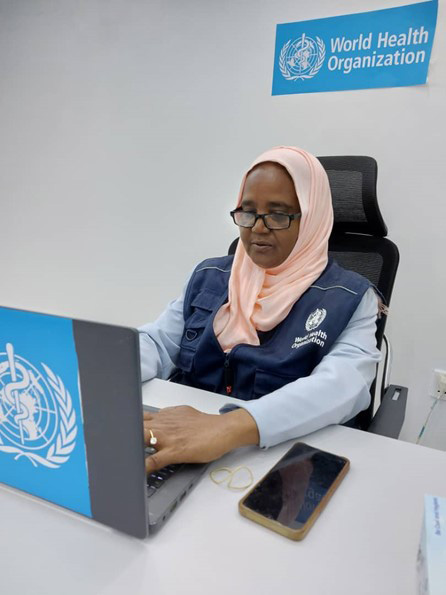Meet the heroes powering our emergency response
Episode 4
 Dr Nahid Idris Salih Khalid: Officer in Charge, WHO operations hub, Gezira, Sudan5 December 2023 – One ordinary Saturday morning in Khartoum, Sudan, during the holy month of Ramadan, I was suddenly awoken by a deafening sound and the house shaking. From the roof, I saw the formidable sight of a fighter jet flying overhead and heavy smoke rising in the distance. The sound grew louder, more aggressive, horrible. A bombshell landed on my neighbour’s house. Armed conflict had erupted between the Sudanese Armed Forces and the Rapid Support Forces. I couldn’t believe what my eyes were seeing.
Dr Nahid Idris Salih Khalid: Officer in Charge, WHO operations hub, Gezira, Sudan5 December 2023 – One ordinary Saturday morning in Khartoum, Sudan, during the holy month of Ramadan, I was suddenly awoken by a deafening sound and the house shaking. From the roof, I saw the formidable sight of a fighter jet flying overhead and heavy smoke rising in the distance. The sound grew louder, more aggressive, horrible. A bombshell landed on my neighbour’s house. Armed conflict had erupted between the Sudanese Armed Forces and the Rapid Support Forces. I couldn’t believe what my eyes were seeing.
Seeking some sense of security, my niece, 6-year-old grandnephew and I made it to the family home. There, all huddled together in the living room, we lived through the most harrowing 6 days and nights of our lives, with constant bombing and shells dropping nearby. The electricity was cut off and our food and water also ran very low. A bullet missed one of us by mere inches and left a hole in the kitchen wall. These were days of terror and nights of restless sleeplessness.
This was the house where my siblings and I had all grown up, been married and had families. It was also where our parents were buried. Yet the decision to leave our home and the capital was inescapable, and we made a plan to move to Wad Madani, a city in Gezira state.
Like so many other Sudanese families, we left everything behind and set off on the extremely risky journey out of harm’s way, hoping to return when the fighting ended. It was Eid day when we crossed the border to leave Khartoum state, immensely relieved to feel safe again, but also aware that we were now displaced people.
On the eleventh day of the conflict, I received a call from a WHO colleague proposing an urgent meeting with some partners and with Gezira State Ministry of Health to address the war’s severe consequences on the health system. Visiting the hospitals in the area revealed the extent of the suffering: huge crowds of patients, mostly renal dialysis patients, were fighting for survival.
We were a group of about 10 WHO staff members, all displaced to Wad Madani. The immediate priority was the arrival and distribution of supplies to health facilities. The Ministry of Health, hospitals and partners all eagerly awaited the WHO trauma kits and emergency kits to support their quickly dwindling supplies.
We set 3 initial team objectives. First, receive the supplies from Port Sudan and distribute them to facilities and partners. Second, establish a WHO operations hub in Gezira. Third, initiate the WHO health response plan to ensure the provision of essential services. We achieved them all.
While attending to my humanitarian duties, deep sadness for what had befallen my city never left me. With half of my family still in Khartoum, I always jumped to catch the news on TV whenever electricity was available. Without fail, seeing my country on the screen always broke my heart.
Being involved at first hand, seeing the patients’ suffering, hearing stories from close friends and neighbours, and witnessing the misery of other displaced people fuelled in me a drive to help in any capacity, even beyond my professional scope. Emotions ran high and passionately fed every detail of the operation. The joy of delivering the tiniest amount of help is impossible to describe.
About a month after my displacement, I was assigned as Officer in Charge of the WHO operations hub in Gezira, and the team expanded. Colleagues all came from similar circumstances of displacement, scattered families and extremely challenging financial conditions due to the disruption of the banking system. The hub became more of a family than a work team as we faced many difficulties together. We could have chosen to flee the country – a totally justifiable decision given the circumstances – but we all felt a duty to stay and help those in need.
Working in front-line emergency response requires full consciousness of the importance of immediate actions, and full awareness of people’s needs. It also runs on strong determination, patience and passion. We need to feel others’ pain to motivate ourselves to achieve despite our own difficulties.
This deeply personal, extremely challenging experience as a humanitarian in Sudan during the war has completely changed my life.


